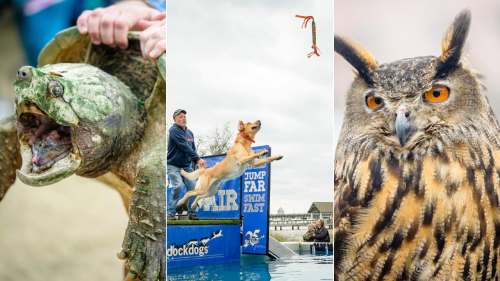Places. 💯
Today is International Women’s Day 2018 – a universal day for celebrating women + their achievements, and also calling for gender parity. The day has been observed since the early 1990s and each year adopts a theme. Following in tune with the recent movements like #MeToo and #TimesUp, this year’s theme is #PressforProgress.
In honor of IWD, we’re highlighting some notable South Carolina women from the past who made an impact on a national scale. (Thank you for paving the way, ladies.)
Mary McLeod Bethune
Mary McLeod Bethune was born to former slaves in Mayesville, S.C. (Sumter County) in 1875. She was determined to help break the circle of poverty in African American communities through education,+ she started a school for African-American girls in 1904 (later known as Bethune-Cookman University). She worked under the FDR administration as Special Advisor on Minority Affairs, + went on to start the National Council for Negro Women in 1935. You can see her portrait in the S.C. State House.
Septima Poinsette Clark
Septima Poinsette Clark was born in Charleston in 1898 and is known as the “Queen Mother of the Civil Rights Movement.” She was a major leader in organizations like the NAACP, + helped start Citizenship Schools across the South, which taught African Americans to read so they could vote. MLK Jr. asked her to come with him to receive the Nobel Peace Prize because he said she deserved it just as much as he did. Baller.
For more on Septima, you can read our feature on her here.
Clelia Peronneau Mathewes McGowan
Born in Columbia in 1865, Clelia Peronneau Mathewes McGowan served on the South Carolina Board of Education for 7 years + was the first woman elected to public office in Charleston. She served as a social activist on the Committee on Better Race Relations and the Charleston Free Library, + was also a writer.
Eliza Lucas Pinckney
Eliza Lucas Pinckney was born in the West Indies in 1722 before her military family relocated to S.C. in 1738. A few years later, she “single-handedly” launched the state’s indigo industry when her father sent her some indigo seeds from the West Indies.
Looking for more info on Eliza? Check-out this event on Saturday:
Charles Pinckney NHS: “Founding Planter” | 2-2:45 p.m. | Charles Pinckney National Historic Site |1254 Long Point Rd., Mt. Pleasant | free | “Visitors will learn about the life of a Lowcountry planter Eliza Lucas Pinckney who is best known for growing + producing

Modjeska Monteith Simkins | Photo courtesy of Historic Columbia
Modjeska Monteith Simkins
Modjeska Monteith Simkins was born in Columbia in 1899 + became S.C.’s “matriarch of Civil Rights activists.” She was a Benedict College grad and co-founder of Victory Savings Bank, as well as a correspondent for the Associated Negro Press. She was also elected as the first female secretary of the NAACP’s South Carolina state conference, + was a key part of the influential Briggs v. Elliott case. See her famous porch off Elmwood Dr. here.
Althea Gibson
Althea Gibson was born in 1927 in Silver, S.C. (Clarendon County) before her family settled in N.Y.C., where she became a women’s tennis champion at age 12. She went on to be the first African American tennis player to win Wimbledon, the French Open, the Australian Championship, and the US Open. In fact, she was the first African American to ever even play at Wimbledon, and she won the dang thing. She was also a performer, actress, + writer.
DYK: Althea Gibson has a court named after her at the Family Circle Tennis Center? It is home to the largest women’s- only WTA tournament in North America, the Volvo Car Open.
Dr. Matilda Arabelle Evans
Dr. Matilda Arabelle Evans, born in Columbia in 1872, attended the Woman’s Medical College of Pennsylvania + then became the first African American woman licensed to practice medicine in S.C. She opened Columbia’s first African American hospital and fought to provide free medical exams for kids. She even raised six children who were abandoned at her private practice as her own, along with five children she took in from deceased relatives. Amazing.
Sarah Mae Flemming
Sarah Mae Flemming, born in 1933 in Eastover, is said to be the “unsung hero of Civil Rights.” About a year before Rosa Parks, Sarah sat in a whites-only section of a bus in Columbia. After being humiliated by the bus driver, she sued SCE&G (the company operating the bus) – a case that went on to the 4th U.S. Circuit Court of Appeals to join the other cases fighting segregation on city buses.
Sarah Campbell Allan
Sarah Campbell Allan was born in Charleston in 1861. As a young adult, she applied to the Medical College of the State of South Carolina + was rejected because she was a woman. She persisted, with encouragement from her dad. She took a prep course for medicine at the South Carolina College for Women in Columbia (relocated + now named Winthrop), went to med school at the Women’s Medical College of the New York Infirmary for Women and Children, then returned to Charleston for the first ever sitting for the South Carolina Medical Board. She was the only woman there – and scored the highest grade. She got her license in 1894, + went on to work at the South Carolina Hospital for the Insane in Columbia.
If you have time to keep reading, check out these other inspirational women from S.C. history: The Grimke Sisters, Mary Boykin Chesnut, Eartha Kitt, Ann Pamela Cunningham, Augusta Braxton Baker, Dorothy Perry Thompson, Carrie Allen McCray Nickens, Caroline Etheridge Hembal, Jane Bruce Guignard, and Lucile Ellerbe Godbold.
Shout out to some notable, still living S.C.-natives famous for their acting: Viola Davis, Mary-Louise Parker, and Andie MacDowell.
Do something nice for a woman today, CHS. Text a friend. Hug your daughter. Smile at a stranger at the coffee shop. Listen to someone who’s transitioning or struggling with gender identity. We all need to give + receive little acts of kindness.
“Here’s to strong women. May we know them. May we be them. May we raise them.”
–Nicole
Thanks to Historic Columbia and South Carolina State Museum for helping COLAtoday compile this list (then we featured it because it was awesome).












